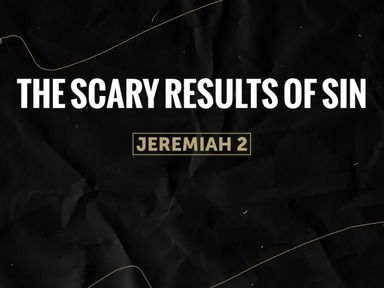The Scary Results of Sin

The Scary Results of Sin
Introduction
Contemporary Problem
Context:
Primary Take Home Truth: God’s justice and hatred for sin demands God’s punishment of sin.
Primary Application: God must be your life’s priority or you will become like what you idolize.
I. The LORD reminds His children of their once youthful vibrancy spiritually (vv 1-3).
Warmth, love, and purity marked her first relationship with her covenant God. Apart from the golden-calf incident (Exod 32:1–29), Israel’s failures in the wilderness came from lack of faith rather than outright apostasy.
II. The LORD spells out to Israel the details of their unfaithfulness. (Jeremiah 2:4-19).
Israel’s attention is directed to the multiplicity of benefits the nation enjoyed at God’s hand; yet the people were unmindful of his presence in their midst (v.6). They had forgotten the wilderness experiences and the dangers the Lord had graciously brought them through. They were brought to a “fertile land” (v.7), literally, “a land of Carmel,” a Carmel land, one well cultivated and productive.
To heighten the effect, Jeremiah uses three strong verbs—šōmmû (“Be astonished”; NIV, “Be appalled”), śāʿarû (“Be agitated”), ḥārḇû (“Be devastated”; NIV idiomatically renders the last two verbs “shudder with great horror”).
Would anyone today be so foolish as to trade an artesian well for a broken cistern? Unfortunately, many do. Some of today’s “broken cisterns” are the pursuit of wealth, power, fame, or pleasure.
Ultimately, her doom would be sealed, not by the presence or absence of treaties with allies, but by her defection from the Lord (v.19).
Her great lack was the reverential fear of the Lord.
Would anyone today be so foolish as to trade an artesian well for a broken cistern? Unfortunately, many do. Some of today’s “broken cisterns” are the pursuit of wealth, power, fame, or pleasure.
The people had abandoned their “glory” (v. 11),12 the Lord who had brought them into the promised land and had embraced worthless idols
III. Israel continues to reject God and live in the attraction of the false gods around them (2:20-28).
Jeremiah compared it to a stain that remains in spite of vigorous scrubbing with mineral alkali (“soda”) and vegetable alkali (“soap”; cf. Ps 51:2, 7; Isa 1:16). No amount of sacrifices brought to the temple could remove the guilt of Judah’s sins (7:9–10; cf. Amos 4:4–5; Isa 1:12–15).
